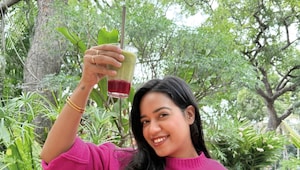Get, set, go(ld): Dhiraj Bommadevara on bringing laurels to Indian archery
Bommadevara chats with Cosmo India about building mental resilience for archery, playing in the World Cup, and more.

The Olympic Games 2024, slated for July, is more than just competing and winning or losing medals. They celebrate hard work and breaking barriers across borders. Archery, a sport demanding exceptional precision and concentration, exemplifies this spirit. As Indian archer, Dhiraj Bommadevara prepares to represent the nation at the Olympics, he talks to Cosmo India about his passion for archery, the mental and physical rigour it demands, his defining moments, and more.
As the largest sports stage in the world comes to life, Cosmo India spoke to athletes who are set to represent the nation on the global platform, about their stories.
Cosmopolitan India: Why did you choose archery?
Dhiraj Bommadevara: I was only five years old when I first tried my hand at archery. Now I don’t even remember the exact reason for choosing the sport—all I know is that I found it different and interesting. But as I grew in the sport, I fell in love with it. Eventually, when I had to choose between archery and academics, I realised my day was incomplete without it. So, that’s what I chose.
C: Archery is a sport that requires high levels of concentration and precision. How do you build the mental strength for it?
DB: In archery, learning the physical skills takes about two to three years. In recurve archery, as opposed to compound archery, building mental resilience is extremely important and necessary. This takes a lot of time. The way we do it is by planning. Before every tournament, we evaluate how many of our targets we are able to execute from our training sessions. To what extent are we able to execute what we have practised in pressure situations. We try to get into the competition zone during training itself. Currently, we’re training with the structure and environment of the Olympic Games in mind.
C: You spoke about how your day is incomplete if you don’t practise archery. Do you think passion is enough to keep one going?
DB: For me, it is passion. Every single day since I have been playing, I have only loved it more. We have our daily training sessions from Monday to Saturday. But even on Sundays, after I get my rest, I just want to go and shoot a few arrows.
C: What is the first thing you do when you win?
DB: Restart.
C: How do you deal with failures then?
DB: Winning is great. But like any other athlete, I’ve learnt most from my failures. Whenever I’ve lost—which is more than the wins (almost a 100:1 ratio), every loss has come with one or many lessons. It could have been my own mistake, my luck, or anything else. Currently, I’m playing in the World Cup and I lost the game. I know I did my best, but so did my opponent. There’s always a difference of only a point between winning and losing—so for me, it’s always how I can become stronger than what I am currently or how I can win in worse situations.
C: What has been the best advice you have received?
DB: One thing that has stayed with me is: ‘What you sow is what you reap’.
C: What has been the most difficult challenge to overcome?
DB: The Asian Games...I had lost in the individual category, two days after we had the team event. It was the most challenging phase of my life. I wasn’t even at my worst while playing. But then, I wanted to perform for my team. I didn’t want my team to lose because of me—they had put in as much effort as me, if not more, to be there. I knew that feeling. The approach was to be the best I could, whatever it takes. I didn’t want to have any regrets.
C: You qualified for the individual event for the Paris Olympics at the Asian Qualifying Tournament in Bangkok last year. Take me through that moment.
DB: The thing is, I knew that the Indian archers deserved it. I just did my job by winning the quota. After winning the individual quota, the aim was to convert that into a team quota for India. We want to push the team rank by playing in the World Cup so that we can get the Olympic quota for the team.
C: How do you deal with pre-tournament jitters?
DB: I just focus on my process, think of my strategies and trying to be detached from my emotions in every situation. I only focus on my performance, not the score. Because your performance is in your control, not how hard or stressful the situation is.
C: What has been your proudest moment yet?
DB: The Asian Games medal (in 2023, India won a team silver at the Asian Games). We earned it after facing several obstacles. I had lost the individual event. So, it was probably the most gratifying moment. Apart from that, I am proud to be shooting every single day of my life, irrespective of the result, but more for the love of the sport
Lead image credit: World Archery
This interview is part of a series that appeared in Cosmopolitan India, May-June 2024 print edition.
Also Read: 5 ways to stay active when you really, really don’t feel like working out
Also Read: Wish to be as fit as Miley Cyrus? Here is a breakdown of her workout routine
more from Life

Why 'Heated Rivalry' has everyone hot, bothered, and obsessed

Regal revivals, fashion shake-ups, and everything new we’re obsessing over this month

When is the new season of 'Euphoria' out? Plus 5 things we know about it

How Aldo became one of the hottest footwear and accessories brands in India

Four photographers on why a good photograph is more than just a good camera

Why writers are side-eyeing ChatGPT (even as they keep using it)

Which 2025 pop culture moment are you?

Eight cities, eight stories—check out where India’s matcha lovers get their fix

The Cosmo-approved holiday beauty list to help you glow through party season

Why your best friend might be the most stable relationship you’ll ever have
